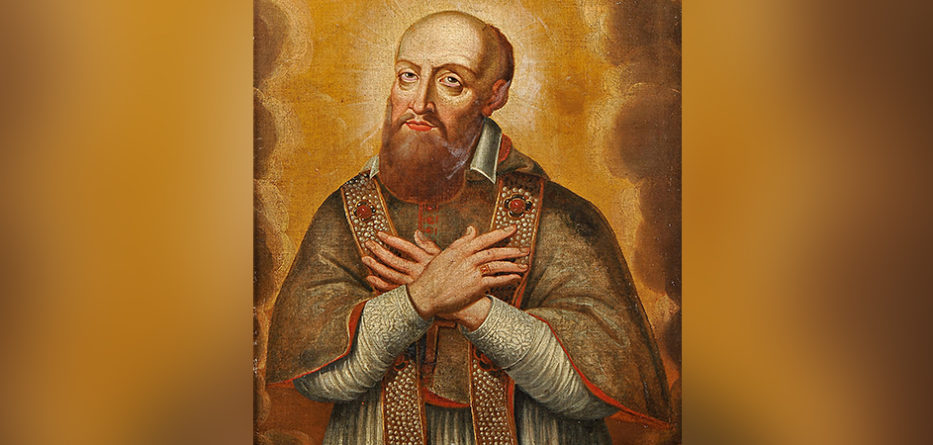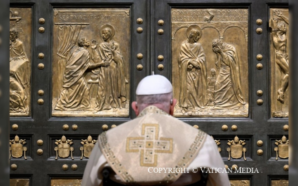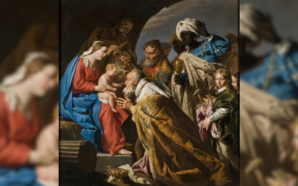24 January is the Memorial of St Francis de Sales
One of the striking features of European Saints who founded religious Congregations after the Reformation is how many of them include de, da, Von or Van in their name. The de or von precedes the town or the family from which they came and indicates that they are descended from the Lord of the town. They belonged to the aristocracy.
The names suggest family wealth. More important, however, they suggest education, a training in public life, connections with people with power and self-confidence that ordinary people lacked. Because their families invested such high hopes and resources into their lives many saints from aristocratic families, including St Francis de Sales, faced great opposition from their families in following their religious calling. They also brought great gifts to it.
Francis de Sales was born in the Kingdom of Savoy into a noble family with connections and responsibilities to the kingdom. Savoy lay on the edge of Switzerland, Italy and France, and its territory was disputed by France and Switzerland. Francis also inherited the religious conflict that followed the Protestant Reformation. Geneva was the centre of Reformed preaching, while France was Catholic. Some regions of Savoy were torn by conflict between Catholics and Calvinists.
Francis was educated in Paris, which was also a centre of religious ferment. In his late teens, he had a strong and life-changing religious experience. He attended a theological discussion on predestination and became convinced that he was condemned to eternal damnation. His preoccupation led to a period of mental torment that lifted only when he was convinced by the Letter of St John that God is a God of love. This recognition shaped his life. It affected particularly his gentleness in relating to Protestants whose understanding of faith he opposed and his compassion for human failure in spiritual direction. In a time made for warriors, he was a peacemaker.
Francis then decided to become a priest, eventually persuading his reluctant father who had invested so much in his succession. He signed away his inheritance. After his ordination, he was sent to an area of Savoy previously under Calvinist control, and so hostile to Catholics. He frequently received death threats in his ministry of forming a small community in faith. He was also sent on diplomatic missions for the Catholic Church to France where he won the trust and friendship of the King. He was made assistant and later full-Bishop of Geneva. As Geneva was under strict Calvinist rule, he lived in the neighbouring French town of Annecy and built the Catholic community through religious education and preaching that focused on God’s love. He also developed an amicable relationship with Theodore Beza, who had brought the Reformation to Geneva.
As a writer, he wrote many explanations of Catholic faith and life, marked by their breadth of view and compassion. One of the works by which he is best remembered is the Treatise on the Love of God, written for the group of Religious Sisters that with Jane Frances de Chantal he had founded. As the de in her name suggests, St Jane Frances also came from a noble family, was well educated, married the Baron de Chantal, administered his estates and those of her father-in-law when he was away, cared for the poor on the estate, and had four children. In 1601, she was 28 when her husband died in an accident. She straightened out his affairs and those of her family. In 1604, she heard Francis de Sales preach Lenten sermons and asked him to be her spiritual guide.
After her children were settled she moved to Annecy, distributed her wealth among her children, and in 1610 joined the group that became the Order of the Visitation. It was notable for encouraging women who were elderly and sick, excluded from other Congregations, to join it, and initially worked among the poor. Her response to critics of her generous admission policy was typically feisty, ‘What do you want me to do? I like sick people myself; I’m on their side’.
By the end of her life, there were over eighty convents of the Sisters, to whom she brought her generosity and administrative ability. Both she and Francis de Sales brought to their following of Jesus natural gifts, gentleness, and a deep love for people living with disadvantage.
Fr Andrew Hamilton SJ writes for Jesuit Communications and Jesuit Social Services.








